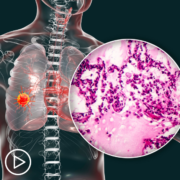What Is Non-Melanoma Skin Cancer?
What Is Non-Melanoma Skin Cancer? from Patient Empowerment Network on Vimeo.
Dr. Vernon Sondak provides an overview of the types of skin cancer and defines non-melanoma skin cancer.
Related Resources:

|

|

A Review of Current Advanced Non-Melanoma Skin Cancer Treatment Options |
Transcript:
Katherine:
Let’s start with the basics Dr. Sondak. What exactly is non-melanoma skin cancer?
Dr. Sondak:
Well, it’s a great question. Sometimes we wish there was a better term, because it obviously is defining this by what it’s not, not by what it is.
Katherine:
Right.
Dr. Sondak:
Melanoma is the most prevalent of the really severe skin cancers. By severe, I mean the ones with the highest chance of spreading and dying. Each year in the United States, there are close to 10,000 deaths from melanoma every year, and about 100,000 cases of invasive melanoma.
But the other forms of skin cancer, and the most common two forms of skin cancer, are basal cell and squamous cell cancers. These two cancers alone, they are about two to three million cases a year, compared to 100,000 melanoma cases.
Katherine:
Wow.
Dr. Sondak:
But probably causing fewer deaths than those 100,000 melanomas. So, there are many, many more of the skin cancers that aren’t melanoma, then there are of the skin cancers that are melanoma.
In fact, there are probably more skin cancers – just if we took basal and squamous cell cancer – there are probably more of those diagnosed every year in the United States than all other forms of cancer put together.
Katherine:
Wow. Wow.
Dr. Sondak:
Now in general, these skin cancers – besides melanoma – are at a low risk of spreading, and metastasizing, and killing the person if their immune system is normal. So, they have almost gotten passed off as, “Oh, it’s just the skin cancer. It’s nothing to worry about.” But when they reach a certain size, when they get to a point where we call them advanced, then now the stakes are higher. It’s not millions of advanced cases, but it’s many tens of thousands of advanced cases in the United States. Some of them do spread and some of them can be life threatening, or even lethal.










